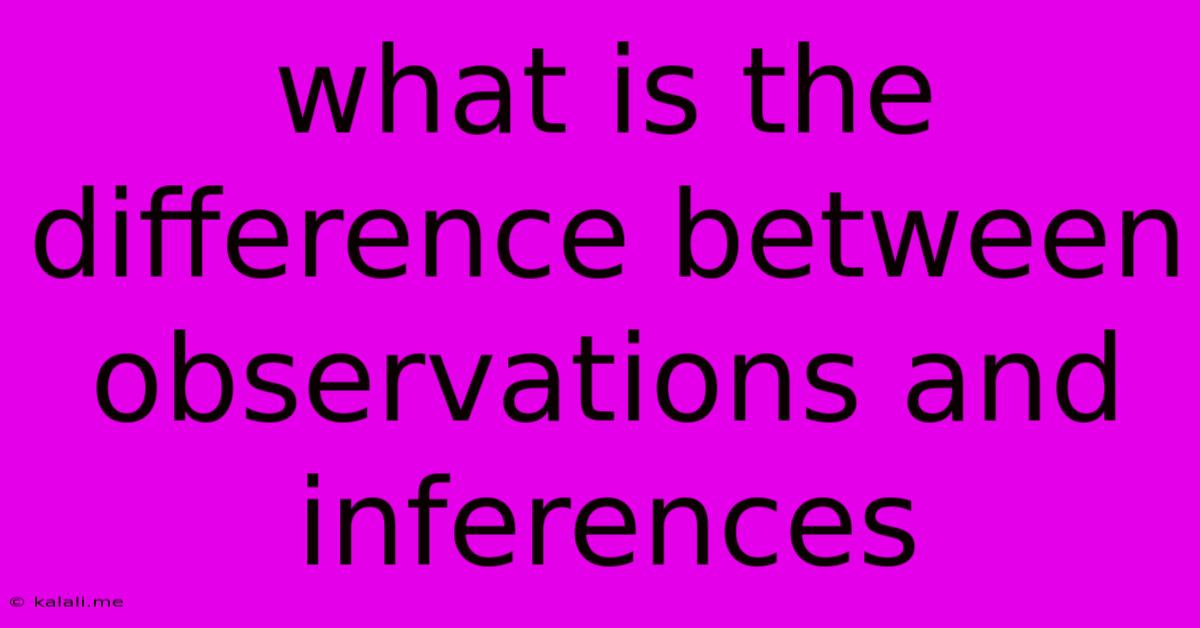What Is The Difference Between Observations And Inferences
Kalali
Jun 15, 2025 · 3 min read

Table of Contents
What's the Difference Between Observations and Inferences? A Crucial Scientific Skill
Understanding the difference between observations and inferences is fundamental, not just in science, but in critical thinking generally. Confusing these two can lead to misunderstandings, misinterpretations, and flawed conclusions. This article will clarify the distinction, providing practical examples to help you master this crucial skill.
Observations are factual statements describing what you directly perceive using your senses: sight, hearing, smell, taste, and touch. Inferences, on the other hand, are interpretations or conclusions drawn from those observations. They are educated guesses based on prior knowledge and experience. Think of observations as the raw data and inferences as the analysis of that data.
What are Observations?
Observations are objective, meaning they should be free from personal biases or feelings. They are verifiable; someone else observing the same phenomenon should record similar observations. Consider these examples of observations:
- "The liquid is blue." This is a direct observation of color.
- "The plant is 12 inches tall." A measurable observation of height.
- "The dog is barking loudly." An observation based on the sense of hearing.
- "The metal feels hot to the touch." An observation based on the sense of touch.
- "The air smells like smoke." An observation based on the sense of smell.
It's crucial to focus on the concrete details when making observations. Avoid adding subjective opinions or assumptions. For instance, saying "The liquid is a beautiful blue" moves beyond observation into interpretation.
What are Inferences?
Inferences go beyond what is directly observable. They involve interpreting observations, combining them with existing knowledge, and reaching a conclusion. Inferences are subjective; different people may draw different inferences from the same observations. Let's look at some examples:
- Observation: "The liquid is blue." Inference: "The liquid is water." (This is an inference because blue liquids can be many things beyond water).
- Observation: "The plant is 12 inches tall." Inference: "The plant is healthy and well-nourished." (This inference depends on knowledge of plant growth).
- Observation: "The dog is barking loudly." Inference: "The dog is angry or scared." (This is an inference; the barking could be due to excitement or other reasons).
- Observation: "The metal feels hot to the touch." Inference: "The metal has been recently exposed to a heat source." (This is an inference; other factors could cause the metal to be hot).
It's important to understand that inferences can be correct or incorrect. The validity of an inference depends on the accuracy of the observations and the relevance of the prior knowledge used to interpret them.
Improving Observation and Inference Skills
Developing strong observation and inference skills requires practice. Here are a few tips:
- Pay close attention to detail: Train yourself to notice small, seemingly insignificant details.
- Ask questions: Continuously question your observations and inferences. Are they based on concrete evidence?
- Consider alternative explanations: Don't jump to conclusions. Explore multiple possible inferences before settling on one.
- Consult reliable sources: If you are unsure about an inference, research the topic to verify your conclusion.
- Practice regularly: The more you practice distinguishing between observation and inference, the better you will become at it.
By mastering the art of distinguishing observations from inferences, you will enhance your critical thinking abilities, improve your scientific investigations, and make more informed decisions in all aspects of life. This fundamental skill is crucial for effective problem-solving and building a solid understanding of the world around us.
Latest Posts
Latest Posts
-
A Ship Sails At 15 Miles Per Hour
Jun 15, 2025
-
Moment Of Inertia Of At Section
Jun 15, 2025
-
Capital Of Dadar And Nagar Haveli
Jun 15, 2025
-
Density Of A Unit Cell Formula
Jun 15, 2025
-
100 Aptitude Questions And Answers Pdf Download
Jun 15, 2025
Related Post
Thank you for visiting our website which covers about What Is The Difference Between Observations And Inferences . We hope the information provided has been useful to you. Feel free to contact us if you have any questions or need further assistance. See you next time and don't miss to bookmark.